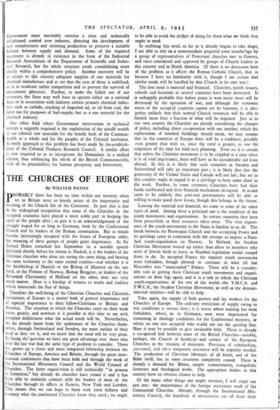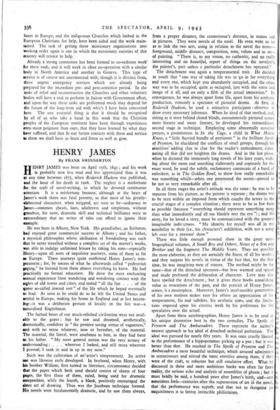THE CHURCHES OF EUROPE
By WILLIAM PATON
PROBABLY there has been no time within our memory when . we in Britain were so keenly aware of the importance and meaning of the Church life of the Continent. In part this is due to the widespread recognition that some of the Churches in the occupied countries have played a most noble part in keeping the spirit of the people alive ; in part it is an acknowledgement of the struggle waged for so long in Germany, both by the Confessional Church and by leaders of the Roman communion. But as minds become increasingly occupied with the future of European order, the meaning of these groups of people gains importance. As Sir Samuel Hoare remarked last September in a notable speech delivered shortly before his return to Madrid, it is the leaders of the Christian churches who alone are saying the same thing, and bearing the same testimony to the same eternal realities—and whether it is the Archbishop of Munich or the Bishop of Munster on the one hand, or the Primate of Norway, Bishop Berggrav, or leaders of the Reformed Christianity of Holland on the other, does not very much matter. Here is a kinship of witness to truths and realities which transcends the flux of things.
Therefore the well-being of the Christian Churches and Christian. institutions of Europe is a matter' both of general importance and of especial importance to their fellow-Christians in Britain and America. The situation in which the Churches carry on their work varies greatly, and nowhere is it possible at this time to say with complete definiteness what the actual needs will be. Nevertheless, we do already know from the spokesmen of the Churches themselves, through Switzerland and Sweden, the main outline of their nced as they see it, and we know that the need will be, very great. In facing the' question we have one great advantage over those who after the last war had, the same type of problem to consider. There has grown up a closer and more integrated fellowship between the Churches of Europe, America and Britain, through the great international, conferences that have been held and through the work of the International Missionary Council and the World Council of Churches. The latter organisation is still technically "in process of formation," but already 8o churches have joined it and it has b...en able to maintain contacts with the leaders of most of the Churches through. its offices in Geneva, New York and London: This means that we can hope to learn with some fullness and accuracy what the continental Churches know they need ; we ought
to be able to avoid the darfter of doing for them what we think they ought to need.
In outlining this need, so far as it already begins to take shape, I am able to rely on a memorandum prepared some montheago by a group of representatives of Protestant churches met in Geneva, and since considered and approved by groups of Church leaders in this country and in North America. (If there is no discussion here of the problem as it affects the Roman Catholic Church, that is because I have no familiarity with it, though I am certain that similar needs will be handled by that Church in its own way.) The first need is material and financial. Churches, parish houses, schools and hospitals in several countries have been destroyed. It. is unhappily probable that before peace is won many more will be destroyed by the operation of war, and although the economic Mills of the occupied countries cannot yet be foreseen, it is altogether unlikely that their normal Church resources will be able to furnish more than a fraction of what will be required. Just as in our own country the Churches are already considering the changes of policy, including closer co-operation with one another, which the replacement of bombed buildings should mean, we may assume that in the countries of Europe there will be a readiness, possibly even greater than with us, since the need is greater, to use the exigencies of the time for bold new planning. Even so, it is certain that unless the Christian movement is to be crippled at a time when it is of vital importance, there will have to be considerable aid from abroad. In this it is likely that such countries as Sweden and Switzerland will take an important part ; it is likely also that the generosity of the United States and Canada will not fail ; but we in this country ought to regard it as a privilege to have some share in the work. Further, in some countries Churches have had their funds confiscated and their financial mechanism disrupted. It would seem to be unlikely that post-war governments will be able or willing to make good these losses, though this belongs to the future.
Leaving the material and financial, we come to some of the other types of need. Among these a principal one is the condition of the youth movements and organisations. In certain countries they have been proscribed, or their resources taken away. The vital importance of the youth movements to the Nazis is familiar to us all. The break between the Norwegian Church and the occupying Power and its quislings came in connexion with the attempt to impose a Nazifled youth-organisation on Norway. In Holland, the Student Christian Movement wound up rather than allow its members who were of Jewish birth to leave, as Nazified legislation would compel them to do. In occupied France the separate youth movements were forbidden, though allowed to continue in what till last November was "unoccupied" France. There will be a considerable task in getting these Christian youth movements and organisations on their legs again, and it is a task in which the Christian youth-organisations of the rest of the world—the Y.M.C.A. and Y.W.C.A., the Student Christian Movement, as well as the denominational societies—will be able to help.
Take, again, the supply of both pastors and lay workers for the Churches of Europe. The ordinary restriction of supply owing to war conditions is serious here ; it is worse where training has been forbidden, where, as in Germany, men were imprisoned for examining in theology candidates for the Confessional ministry, or where no one was accepted who would not toe the quisling line. Here it may be possible to give invaluable help. There is already a recognised link between some of the British Churches—notably, perhaps, the Church of Scotland—and certain of the European Churches in the training of ministers. Provision of scholarships, personnel, and oth r temporary assistance will be urgently needed. The production of Christian literature of all kinds, and of the Bible itself, has in some oxintries completely ceased. There is already a demand for Bibles, simple commentaries, evangelistic literature and theological works. The appropriate bodies in this country have an obvious chance to help.
Of the many other things one might mention, I will single out just one: the maintenance of the foreign missionary work of the Continental Churches. Already, through the International Missionary Council, the hundreds of missionaries cut off from their bases in Europe, and the indigenous Churches which looked to the European Christians for help, have been aided and the work maintained. The task of getting these missionary organisations into working order again is one in which the missionary societies of this country will rejoice to help.
Already a strong committee has been formed to co-ordinate work' for these ends, and it will work in close co-operation with a similar body in North America and another in Geneva. This type of service is of course not unconnected with, though it is distinct from, those urgent emergency services which are already being prepared for the immediate preand post-armistice period. In the tasks of relief and reconstruction the Churches and other. voluntary bodies will have a task to perform in liaison with Government effort, and upon the way these tasks are performed much may depend for the future of the long-term aid with whicti I have been concerned bete. The one essential thing is that it should be recognised by all of us who take a hand in this work that the Christian peoples of the European continent have been through experiences even more poignant than ours, that they have learned by what they have suffered, and that In our future contacts with them and service so them we shall have to learn and listen as well as give.























 Previous page
Previous page